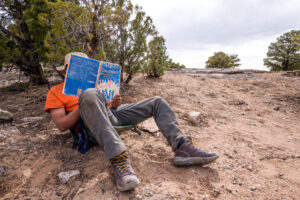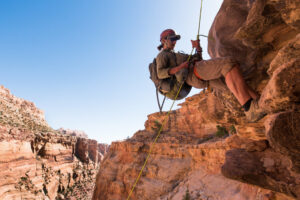It is our mission to provide the most engaging and effective Outdoor Behavioral Healthcare treatment program for adolescents. Change happens when one feels safe, inspired, and confident to make one’s life their own. We believe it’s our responsibility to create this environment while empowering our clients through open and honest dialogue, and concrete resources.
To make the most of the small window of time we are afforded with each student and his family, we have built a curriculum designed to afford both high impact for the present and clear diagnostic information for the future. As you click through the following modalities below (or simply scroll through them in turn), please understand that each piece serves as a different way to approach the same end: helping our boys a) understand their role in their life and b) develop the skills to make real change happen.
Each element of this program is designed to cast a wide net in order to help each student engage in the way that best fits his individual needs and experience. For example, with therapist guidance to individualize the experience, some boys will only touch upon the 7 challenges whereas for others it will serve as a centerpiece to their experience.
Don’t hesitate to call us to talk specifically about your son and how these interventions might best fit his needs.
What is Outdoor Behavioral Healthcare?
Outdoor Behavioral Healthcare (OBH), also referred to as wilderness therapy or adventure therapy, is often an alternative treatment approach for adolescents with co-occurring mental health conditions. A key feature of OBH is “the prescriptive use of wilderness experiences by licensed mental health professionals to meet the therapeutic needs of clients”.1
The main components of OBH include:
- Extended backcountry travel and wilderness living experiences
- Active and direct use of clients’ participation and responsibility
- Continual group living and regular formal group therapy sessions to foster teamwork and social interactions
- Individual therapy sessions, supported by the inclusion of family therapy
- Adventure experiences utilized to enhance treatment by fostering the development of eustress (ie, the positive use of stress) as a beneficial element in the therapeutic experience
- The use of nature in reality as a metaphor within the therapeutic process and
- A strong ethic of care and support throughout the therapeutic experience.1
Outdoor Behavioral Healthcare has been shown to be a more successful mental health intervention than “treatment as usual”, such as outpatient services. One study comparing OBH with treatment as usual found treatment gains from one-year post treatment were three times larger in the OBH group.2
Dialectical Behavioral Therapy
Dialectical Behavioral Therapy
Seven Challenges
Seven Challenges
The Family Element
Family Program
Adventure
Adventure
Individual and Group Therapy
Individual and Group Therapy
Assessment
Assessment
Dialectical Behavioral Therapy
Dialectical Behavioral Therapy, or DBT, is a powerful multi-modal treatment approach that Elements uses to address the extreme emotional intensity and dysregulation that many of our students struggle with. It’s this intense emotionality that often leads to angry, destructive or counterproductive behaviors. DBT emphasizes personal responsibility and helps our students examine how they deal with conflict and negative feelings. The goals of our DBT program include identifying maladaptive coping patterns and providing students with adaptive coping strategies to promote healthier behaviors and psychological well-being.
DBT combines the basic strategies of cognitive-behavioral therapy with mindfulness practices. DBT calls on students to accept current reality while maintaining a strong and conscious commitment to change. DBT has also been modified so that it can be used with other difficulties such as substance use, self-harm and anger management. DBT targets the issues that cause distress and teaches skills to deal with them without having to resort to self-defeating behaviors. It does so in a structured framework that helps us understand that, on the one hand, we are doing the best we can and, on the other hand, even though we can and need to learn better ways of dealing with challenges.
Specific DBT foci include:
- Mindfulness: Focusing the mind, directing attention and understanding how you feel.
- Emotional Regulation: Reducing emotional intensity that can lead to impulsivity and destructive behaviors.
- Distress Tolerance: Reducing impulsivity and managing personal crises.
- Interpersonal Effectiveness: Keeping relationships steady, getting what is needed and maintaining your self-respect.
Seven Challenges
 Elements uses the Seven Challenges approach to address all levels of drug or alcohol involvement—from experimentation to addiction. We have found this approach particularly useful in dealing with adolescent substance abuse because it does not depend upon “hitting rock bottom,” is not shame-based and can work with any level of abuse. It can also be used in a complementary fashion with other more traditional chemical dependency and addictions treatments. Because the majority of young men struggling with emotional and behavioral issues have engaged in some form of substance abuse, the Seven Challenges is a central aspect of our programming and is useful for both treatment and prevention.
Elements uses the Seven Challenges approach to address all levels of drug or alcohol involvement—from experimentation to addiction. We have found this approach particularly useful in dealing with adolescent substance abuse because it does not depend upon “hitting rock bottom,” is not shame-based and can work with any level of abuse. It can also be used in a complementary fashion with other more traditional chemical dependency and addictions treatments. Because the majority of young men struggling with emotional and behavioral issues have engaged in some form of substance abuse, the Seven Challenges is a central aspect of our programming and is useful for both treatment and prevention.
The following material is excerpted from the Seven Challenges website and will give you an overview of the program:
The Seven Challenges® Program is designed specifically for adolescents with drug problems, to motivate a decision and commitment to change – and to support success in implementing the desired changes. The Program simultaneously helps young people address their drug problems as well as their co-occurring life skill deficits, situational problems, and psychological problems.
The challenges provide a framework for helping youth think through their own decisions about their lives and their use of alcohol and other drugs. Counselors using The Seven Challenges Program teach youth to identify and work on the issues most relevant to them. In sessions, as youth discuss the issues that matter most, counselors seamlessly integrate the Challenges as part of the conversation.
The Seven Challenges is listed as an evidence-based program in the SAMHSA National Registry of Evidence-Based Programs and Practices. The Seven Challenges received a perfect score in the “Readiness for Dissemination” category, with the review stating:
“Clear, logically organized, and comprehensive materials are provided to support implementers, supervisors, and administrators. The Program materials, trainings, ongoing support and monitoring work effectively to ensure a successful implementation.”
The Seven Challenges that form the basis of this program are:
Challenge #1
We decided to open up and talk honestly about ourselves and about alcohol and other drugs.
Challenge #2
We looked at what we liked about alcohol and other drugs, and why we were using them.
Challenge #3
We looked at our use of alcohol or other drugs to see if it has caused harm or could cause harm.
Challenge #4
We looked at our responsibility and the responsibility of others for our problems.
Challenge #5
We thought about where we seemed to be headed, where we wanted to go, and what we wanted to accomplish.
Challenge #6
We made thoughtful decisions about our lives and about our use of alcohol and other drugs.
Challenge #7
We followed through on our decisions about our lives and drug use. If we saw problems, we went back to earlier challenges and mastered them.
The Family Element
Adventure
A key feature of the experience at Elements is our use of Adventure Programing (AP). During these AP sessions, your son will engage in physically, mentally and emotionally challenging activities such as:
Hiking and Backpacking
Rock climbing
Rappelling
Canyoneering
Fly Fishing
Low ropes and team building initiatives
The act of physically completing these challenging activities results in many positive outcomes including increases in self-confidence, self-efficacy, problem solving skills, effective communication, self-awareness, trust, and developing healthy coping strategies.
After the session, the group processes the events and challenges from the adventure. Through these discussions, students relate what difficulties they encountered during the activity to what personal goals they are working on while at Elements. These activities are rooted in empirically supported Adventure Therapy techniques which have been refined over the last 60 years of implementation and have been shown to bring about positive change that is maintained over time.3, 4
Individual & Group Therapy
Therapy For The Individual
By the time most of our boys get to us, their parents have tried everything imaginable. Accordingly, the majority of our boys have seen a therapist back home. So one might ask, how could this possibly be different? Out here in their one unbroken jouney, our therapists go out to the field to meet our boys in their world. Out here, therapy is virtually unrecognizable to our boys who had previously trained themselves to sit tight and nod their heads for 50 minutes before they could go back to doing what they wanted. Now, our boys are engaging in a new and different way, with no walls, no clock, and only the rest of their lives to figure out. Our therapists are caring and experienced individuals who are skilled at calling it like they see it. Therapy out here is hands-on, engaging, and collaborative, which gives us all the room we need in order to challenge them to live up to their potential. And at the heart of it all, it’s a conversation with a trusted mentor while sitting in a sunny spot under a tree.
Group Therapy
Each therapist is in charge of his/her own group, and is equally interested in the group culture as they are in each individual’s progress. The two are intertwined. Group therapy sessions are run by the therapist twice weekly, and touched upon in group setting (called focus groups and check-ins) multiple times each day by all the staff. Students learn to advocate for themselves and can call a group or check in at any point. The group owns their therapy and each group recognizes quickly that the well-being of each individual is inextricable from the well-being of the whole.
Assessment
For all the powerful experiences we provide in helping our boys and their families create real change in their lives, our job is still not complete if we are not giving every stakeholder a clear assessment of what needs to happen next. Accordingly, each experience provides us with powerful information so that we can all come together to find the best steps into the future.
Parents will touch upon this “big picture” assessment each step of the way, on each weekly call with the therapist. That way when the experience is drawing to a conclusion, there will be no surprises and plans can be developed collaboratively without added stress.
Assessment For The Student
As we see it, the Elements experience should also serve as the first step in our boys taking the reins over their own therapy and their own life. Our therapists want to bring each of our boys along for the assessment as much as it will be possible and beneficial for them. With heightened transparency and a chance for more effective and open communication, each member of the family can leave empowered to make things better as they move forward.
Citations
- Gass, M. (Ed.). (2014). Manual of Accreditation Standards for Outdoor Behavioral Healthcare Programs. AEE.
- DeMille, S., Tucker, A. R., Gass, M. A., Javorski, S., VanKanegan, C., Talbot, B., & Karoff, M. (2018). The effectiveness of outdoor behavioral healthcare with struggling adolescents: A comparison group study a contribution for the special issue: Social innovation in child and youth services. Children and Youth Services Review, 88, 241–248. https://doi.org/10.1016/j.childyouth.2018.03.015
- Bowen, Daniel & Neill, James. (2013). A Meta-Analysis of Adventure Therapy Outcomes and Moderators. The Open Psychology Journal. 6. 10.2174/1874350120130802001.
- Neill, J. T. (2003). Reviewing and benchmarking adventure therapy outcomes: Applications of meta-analysis. J Exp Educ 2003; 25(3): 316-21.

